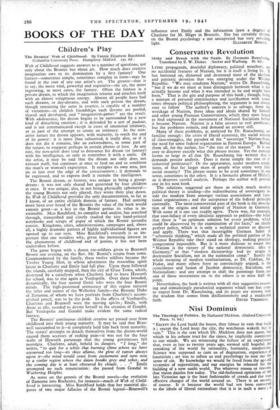Conservative Revolution
Make and Break with the Nazis. By Hermann Rauschning, Translated by E. W. Dickes. (Seeker and Warburg. 8s. 6d.)
LYING propaganda, deceitful diplomacy, political treachery, are no accidental features of Nazism, for it is itself a living lie. It has battened on, distorted and destroyed most of the idealism and patriotic devotion that was emerging under the Weimar Republic. " We may condemn Nazism," writes Dr. Rauschning, "but if we do -we must at least distinguish between what it has actually become and what it was intended to be and might have been." That is the gist and purpose of this book ; though, being a mixture of personal reminiscence and justification with some- times obscure political philosophising, the argument is not always easy to follow The author's concern is to salvage, from the wreckage of Nazism, those ideas and ideals shared by himself and other young Prussian Conservatives, which they once hoped to find expressed in the movement of National Socialism before it became Nazism. Nazism is a false answer to real problems ; but the problems remain, and demand an answer still.
Many of these problems, as analysed by Dr. Rauschning, are familiar enough: the crisis of liberal economy, the social tension of class-struggles, the paradox of the " sovereign " Nation-State, the need for some federal organisation in Eastern Europe. Behind them all, for the author, lies " the rise of the masses." It is not easy to discover exactly what this phrase means. Yet the concept looms so large in all that Dr. Rauschning has written that it demands precise analysis. Does it mean simply the rise of 37. industrial proletariat? Or the appearance, under modern condi- tions, of that far larger mass of people who enjoy very little social security? The phrase seems to be used sometimes in one sense, sometimes in the other. It is a favourite phrase of Hitler's, so it deserves careful analysis. Perhaps the author will provide one in his next book.
The solutions suggested are those to which much modern political theory is tending—the redistribution of sovereignty in- side the modern State amongst various associations and func- tional organisations ; and the acceptance of the federal principle externally. The most controversial part of the book is the descrip- tion of the origins and initial appeal of Nazism in Germany. With some of it one can readily agree. There was, for example, that root-fallacy of every idealistic approach to politics—the belief that there is " an optimum solution for every problem, which could be discovered by the examination of the facts," an ideally perfect policy, which it is only a technical matter to discover and apply. There was that incorrigible German habit of schematic thinking," which made all the political parties of the Weimar Republic take. their stand on ideology, making practical compromise impossible. But is it more dubious to assert that " Nazism is the victory of the national democratic idea in Germany," or that " modern dictatorship had its origin in doctrinaire Socialism, not in the nationalist camp." Surely the whole meaning of modern totalitarianism, as Dr. Cobban, Mt. Fodor, and many others have so convincingly argued, is the coincidence and fusion of Jacobin democracy, Socialism, and Nationalism: and any attempt to shift the parentage from any one of these movements on to the others is to miss half the point.
Nevertheless, the book is written with all that suggestive reason- ing and stimulatingly paradoxical argument which one has come to expect from Dr. Rauschning, and its pages are strewn with the wisdom that comes from disillusionment and a readjusted


























 Previous page
Previous page